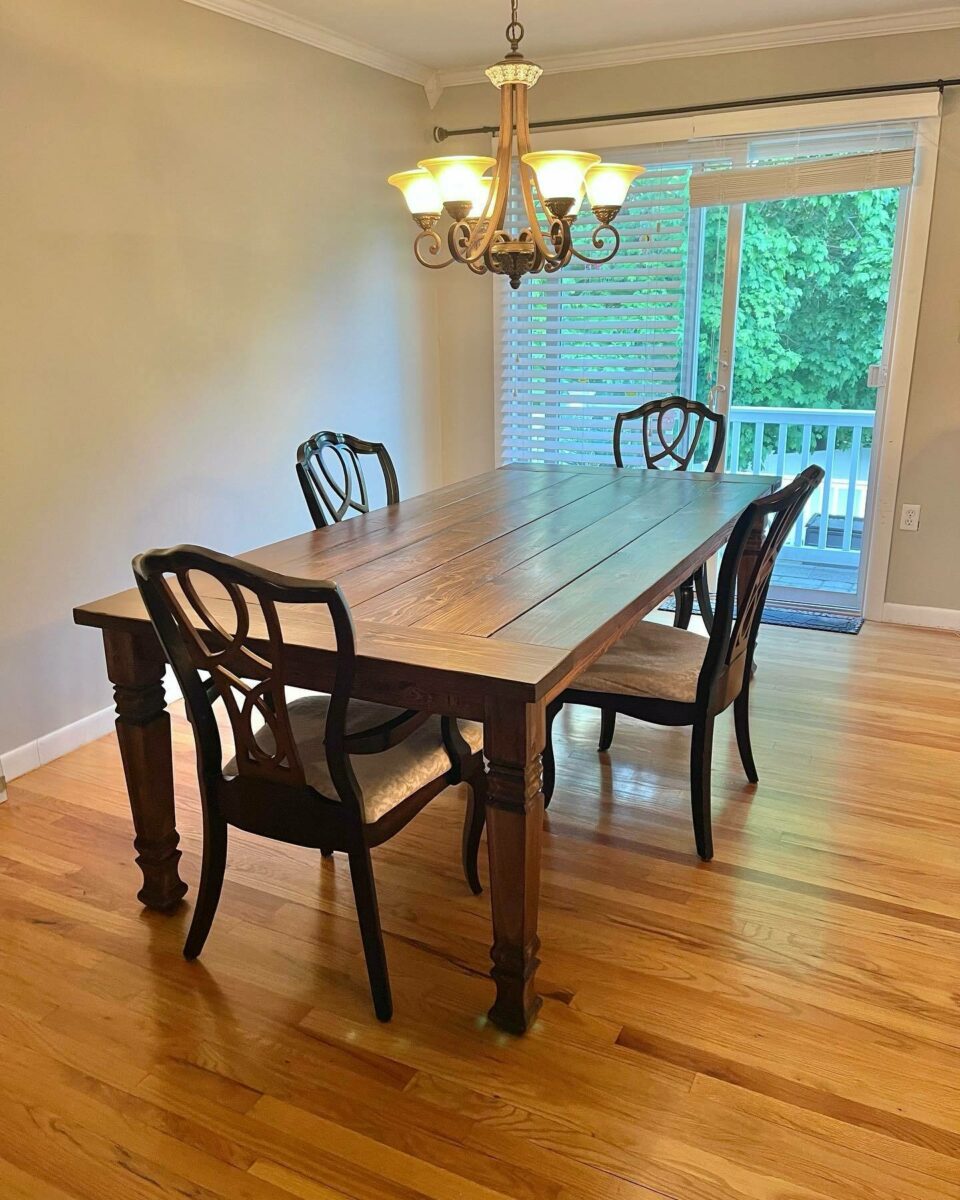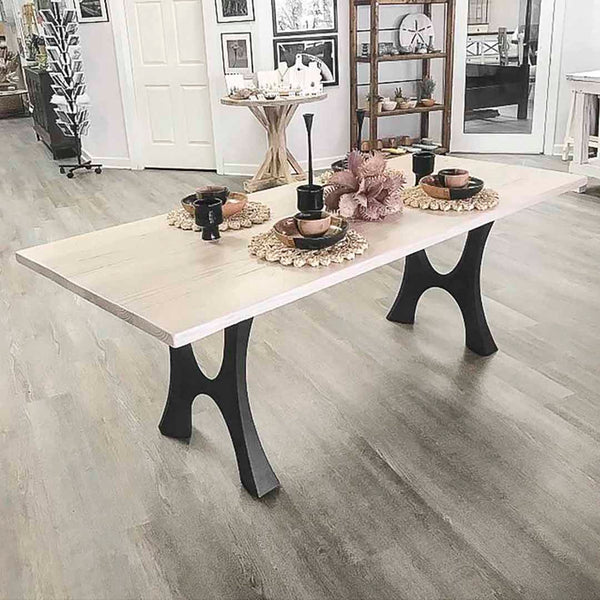Why Dining Room Table Legs Are Crucial for Your Table’s Stability
How to Choose the Perfect Dining-room Table Legs for Your Home Design
Choosing the excellent eating space table legs is a nuanced process that needs careful consideration of different aspects, including your area restraints, visual choices, and sensible needs. The interaction between styles, measurements, and materials can significantly influence the setting of your eating area, making it important to approach this decision systematically.
Assess Your Dining Room
Analyzing your eating room is important for picking the right table legs that complement both visual appeals and capability. Begin by gauging the measurements of your dining location, including ceiling elevation, flooring area, and proximity to other furnishings. This details will help figure out the suitable size and elevation of your table, which directly influences the choice of table legs.
Next, consider the design and layout of your eating space. For instance, an open-concept layout may benefit from table legs that use visual agility, such as slim steel or acrylic alternatives. Conversely, a much more typical setup could require durable wooden legs that provide a sense of durability.
Review the existing color scheme and materials in your dining location. Integrating the table legs with these elements develops a natural appearance that boosts the overall style. In addition, think of the performance called for in your space. If you often hold large celebrations, think about legs that provide extra support and security.
Ultimately, a comprehensive analysis of your eating space will assist you in making an informed decision, making sure that your table legs not only enhance the visual allure yet likewise offer practical purposes.
Consider Your Style Preferences
When choosing dining-room table legs, it is necessary to assess your personal design choices, as they significantly affect the total aesthetic of your dining area. Your selection of table legs can either enhance or contrast with existing decoration, making it important to align them with your favored interior decoration theme.
If your home leans towards a contemporary aesthetic, think about smooth metal or minimal wood legs that supply a clean, clean look. For a more conventional method, ornate wooden legs with intricate carvings can add a touch of style and elegance. Industrial styles gain from robust, basic materials such as redeemed timber and metal mixes, reflecting a rugged appeal.
In addition, farmhouse and rustic styles commonly prefer strong, chunky legs that stimulate a sense of warmth and comfort. Conversely, if your décor is eclectic, you could choose unusual forms or a mix of products to create visual passion.

Evaluate Material Options
The choice of material for dining space table legs plays a critical function in both resilience and aesthetic allure. Usual materials include wood, metal, and composite options, each offering unique qualities that can influence the general appearance and durability of your table.
Timber is a classic choice, known for its heat and flexibility. Woods like oak and walnut supply exceptional toughness and can be completed in various spots to match any type of decor. Softwoods like want are much more prone to dents and scrapes, making them less ideal for high-traffic areas.
Metal legs, typically crafted from steel or aluminum, exude modernity and industrial appeal. They are extremely resilient and resistant to put on, making them suitable for families with youngsters or constant celebrations (dining room table legs). Furthermore, steel can be completed in different shades, improving the customization opportunities
Composite products, such as MDF or laminate, offer cost and varied styles. While typically less resilient than click here for info strong timber or metal, they can still offer a fashionable appearance and are frequently easy to keep.
Eventually, the product you choose must straighten with your lifestyle, visual preferences, and the level of usage your table will experience.
Determine Elevation and Dimension
Picking the appropriate height and size for your dining area table is vital for both performance and convenience. The basic height for eating tables typically my link varies from 28 to 30 inches, permitting enough legroom for most individuals when seated. It is crucial to think about the dimensions of your dining area and the kinds of chairs you prepare to utilize.

Furthermore, consider the proportions of your dining-room. A larger table in a roomy area can produce a grand setting, while a smaller sized table functions well in even more intimate setups. Eventually, the ideal elevation and dimension will integrate with your total style and boost the eating experience for you and your visitors.
Explore Modification Opportunities

Furthermore, the design of the legs can be tailored to fit different styles, such as rustic, modern-day, or industrial. For instance, conical legs can evoke a mid-century contemporary feel, while beefy, block-style legs might reverberate with typical or farmhouse style.
Homeowners can likewise discover color coatings, from natural timber spots to repaint, enabling them to match or comparison with the tabletop and bordering design.
Moreover, leg elevation can be adjusted to fit specific seating plans or individual preferences, boosting both comfort and performance.
Finally, distinct decorations, such as carvings or decorative braces, can better individualize the table legs, making the eating experience not just a meal her explanation however a declaration item in the home. By taking into consideration these modification choices, homeowners can develop a dining-room table that absolutely shows their originality.
Conclusion
Selecting the perfect dining-room table legs requires careful consideration of various aspects, consisting of the measurements of the dining area, design choices, material durability, and wanted height. Personalization alternatives further enhance the capability to attain a cohesive aesthetic that enhances the overall design. By systematically reviewing these components, house owners can make certain that the chosen table legs not only meet functional requirements yet also add positively to the dining experience and setting of the home.
Choosing the optimal dining space table legs is a nuanced process that needs mindful factor to consider of various aspects, including your room restrictions, aesthetic preferences, and practical requirements.Examining your dining space is important for choosing the right table legs that enhance both looks and capability.When establishing size, gauge the area where the table will certainly be put to guarantee it fits comfortably, allowing for at the very least 36 inches of clearance around the table for simple motion. A bigger table in a large area can create a grand ambiance, while a smaller table functions well in even more intimate setups.Picking the ideal eating area table legs calls for cautious factor to consider of different aspects, consisting of the measurements of the eating room, design choices, product durability, and wanted elevation.